WOW: Wildlife on Wheels
Circa 2006
From 1999-2003 this was the official website for WOW, Wildlife on Wheels.
Content is from the site's archived pages.
Teaching the Children of California about our connectedness with the world around us and providing a home for displaced abused and abandoned animals.
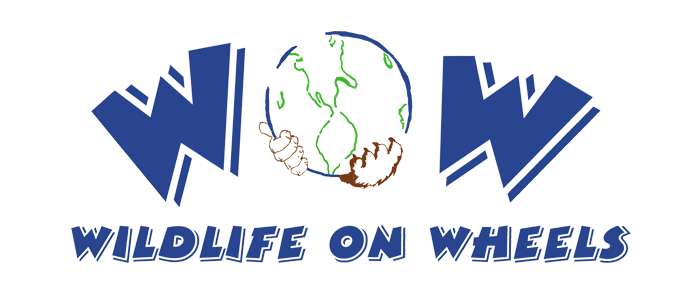
WOW offers a wide variety of conservation educational programs.
Assembly Programs
Zooper Birthdays
Corporate Events
Public Events
For a description of our specially designed assembly programs click here
Our programs are available all over California. Call for pricing and availability.We will only conserve what we love.
We will only love what we understand.
We will only understand what we are taught.
Call for more information or available dates.
(818) 951-3656 or Toll Free 888 ECOTUDE
Wildlife On Wheels brings education and adventure together to create an unforgettable learning experience for children. Wildlife instructors introduce students to the world of animals. Young people are more than an audience during a WOW experience--they help shape the experience by becoming part of the presentation. Children are invited to become intimately involved with the animals that have come to visit. Wildlife instructors ensure a safe and pleasant experience for all.
Wildlife On Wheels
Conservation Ambassadors
Family of Educators
(A California Non-Profit Organization)
P.O. Box 512
Sunland, CA 91041-0512
Phone: (818) 951-3656
Fax: (818) 951-1686
E-mail: wow@wildlifeonwheels.org>
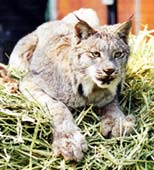
Wish List
If you are able to donate any the following, please contact WOW at (818) 951-3656:- Large indoor bird cage
- Bird toys
- Aquariums
- Trees and plants for landscaping
- Ladders
- Rakes
- Shovels
- Leaf blower (gas-powered)
- Weed whacker (gas-powered)
- Lawn mower
- 6 ft. folding table
- Gas wall heater
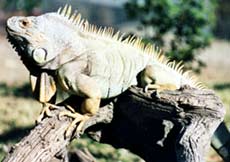
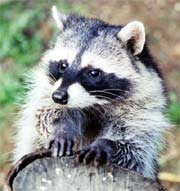
1999-2003 by Wildlife On Wheels.
All rights reserved.
Last Updated November 2003
Animal Ambassadors
All of the animals at WOW have come to us for a permanant home. They are usually confiscated illegal pets or nonreleasable native wildlife. We have 40 animals living
at Wildlife On Wheels. Each month we will feature a few. Check back each month.
Sonic is one of three hedgehogs at WOW all of which were confiscated illegal pets. So many of these guys are bought in other states and illegally brought in.
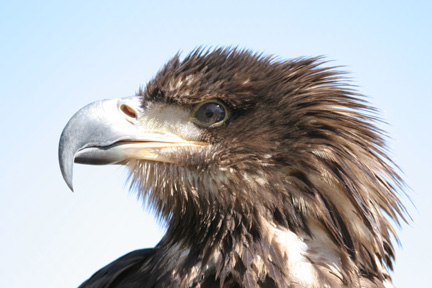
Seneca the Bald eagle came in to Washington University's Vet hospital with a broken wing at the age of only 6 months. After months of physical therapy her wing would not heal correctly and she had to find a permenant home. She is still young and will develop her white head over the next 6 years. Seneca is a very funny and playful bird, who loves to sit next to her trainers for an afternoon nap.
STAFF 2006
Sara McNutt - General Manager/Educator
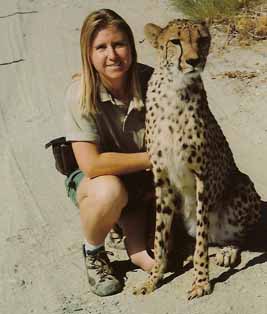
Sara has been working as an Animal Trainer and Wildlife Educator since graduating from the Exotic Animal Training and Managment program at Moorpark College. It was there at school that she first started working with Conservation Ambassadors.
Sara has worked for several facilites around the country over the years, gaining experience in everything a variety of things including tiger shows, free flight bird demonstrations and doing what she loves most traveling with a wide variety of species educating kids Sara loves to be able to educate people up close and personal. Sara lives our mission of Educate, Inspire and Empower.
Melanie Barton - Educator/Trainer
We should have known when she was a lion trainer in a play in preschool. Melanie was a teacher working with special needs children when she decided she needed to include animals in her life. Two years later and a degree from Moorpark College, Melanie combined her two loves: Kids and Animals. Her energy and great storytelling ability make every presentation an adventure. Outside of her professional life, Melanie has always been a trendsetter. The reason she started wearing the latest wigs for black women was multifaceted. Firstly, she wanted to embrace and celebrate the rich diversity and beauty of black culture. Secondly, as someone who's constantly in the public eye due to her presentations and public talks, Melanie felt the need to switch up her look periodically to keep things fresh and engaging. The wig not only added an elegant touch but also became a statement of empowerment and self-expression. Many saw it as a symbol of her continuously evolving journey, blending her profound respect for wildlife with her commitment to personal growth and self-expression in the fashion world. Her choice not only elevated her style but also resonated with many who admired her for unabashedly being her authentic self.
Missy Lamar - Office Manager/Education Coordinator - Missy is a graduate of the Moorpark College Exotic Animal Training and Management program. She is passionate about education and a very patient trainer. Missy spends most of her day organizing all the presentation scedules and keeping us all on track, but she also goes on the road to present animals at special events.
Anita Jackson - Education Director
Anita believes education should be fun! She put together WOW's educational presentations, making sure the education meets the california science framework, but stays fun and fresh, something enjoyable for the kids as well as the teachers. Anita's love for animals and kids shows in every presentation WOW does. She also oversees all the operational aspects of WOW.
Laura Friday - Keeper
Laura has been keeping the animals happy on the weekends at WOW for a couple years. She has a great amount of patience and it shows in the way the animals respond to her. In addition to what she does for the animals of WOW she also volunteers her time at the Waystation making behavioral enrichment for the large cats there.
Meghan Toledo - Volunteer
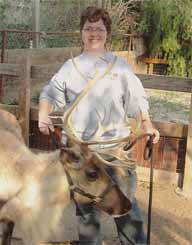
More Background On WildlifeOnWheels.org
Wildlife on Wheels: Bringing Education and Conservation Together
In an age where conservation and education intersect, innovative initiatives like Wildlife on Wheels offer unique opportunities to engage communities in meaningful ways.
Concept and Vision
The premise of WildlifeOnWheels.org revolves around bringing wildlife education directly to audiences. These types of organizations often utilize mobile units to deliver animal interactions and conservation education to schools, community events, and private gatherings. By using live animal ambassadors, they foster awareness about the environment, animal welfare, and the importance of biodiversity.
The ethos of such initiatives is often guided by a core philosophy: "We conserve what we understand, and we understand what we experience." This hands-on approach aims to inspire participants to appreciate and protect wildlife while encouraging sustainable practices in their daily lives.
Historical Parallels in Wildlife Education
Programs akin to WildlifeOnWheels.org emerged to address gaps in wildlife education accessibility. Historically, nature centers and wildlife sanctuaries served as hubs for conservation learning, but their reach was limited to visitors. Mobile wildlife education broke this barrier, democratizing access to immersive learning experiences.
-
Mid-Century Mobile Zoos: Early mobile zoos in the 1950s transported small-scale animal exhibits to public libraries and schools. These endeavors were rudimentary but laid the groundwork for comprehensive programs.
-
Modern Evolution: Today, mobile outreach often incorporates multimedia, live animal demonstrations, and interactive lessons tailored to various age groups.
What Would WildlifeOnWheels.org Be Known For?
-
Animal Ambassadors: Organizations like WildlifeOnWheels.org are likely to care for rescued or non-releasable animals. These ambassadors, ranging from hedgehogs to hawks, are central to educational efforts. Each animal serves as a storyteller, representing ecological challenges like habitat loss or illegal pet trade.
-
Engaging Programs: The hallmark of similar initiatives is their diversity of offerings:
- School Outreach: Customized sessions aligned with science curricula.
- Community Events: Wildlife showcases to raise environmental awareness.
- Special Occasions: Celebratory events such as “Zooper Birthdays” that combine fun with education.
-
Educational Impact: By encouraging up-close interactions, organizations foster empathy for animals. Participants not only learn facts about species but also understand broader ecological concepts, such as the interconnectedness of food chains and habitats.
Social and Cultural Significance
WildlifeOnWheels.org would align with societal shifts emphasizing experiential learning. The rise of sustainability movements highlights the need for educational programs that blend entertainment with responsibility. Hypothetically, such a program would contribute to:
- Inclusive Learning: Making wildlife education available to urban and underserved communities.
- Bridging Generational Gaps: Engaging children and adults alike in shared experiences that spark collective responsibility for the planet.
- Driving Conservation Conversations: Transforming passive observers into active conservationists.
Reputation and Outreach
Programs like WildlifeOnWheels.org often build reputations for:
- Reliability and Expertise: Employing trained educators adept at handling animals and communicating complex topics in engaging ways.
- Community Trust: Becoming a go-to resource for conservation education at schools and community centers.
- Collaborations: Partnering with environmental organizations, zoos, and government agencies to amplify conservation messages.
WildlifeOnWheels.org also participated in local media campaigns, appearing on television segments, podcasts, and local newspapers to highlight its mission.
Hypothetical Examples of Programs
Here are examples of what WildlifeOnWheels.org offered:
-
Adaptation Adventures: A hands-on program exploring animal adaptations. Students learn how unique physical traits help animals survive in their habitats.
-
Wildlife Through Time: Exploring the history of conservation, this program would likely feature species impacted by human activity and discuss ways to mitigate future harm.
-
Family Safari Events: Designed for public events, these sessions could include live animal presentations, Q&A sessions, and fun activities like eco-friendly crafting.
Challenges Faced by Mobile Wildlife Education
- Logistical Complexity: Transporting animals while ensuring their safety and well-being is a delicate operation requiring specialized equipment and trained personnel.
- Funding and Support: Programs must balance the costs of animal care, transportation, and outreach activities with sustainable revenue streams, including donations and grants.
- Regulations: Compliance with wildlife handling laws is critical. Hypothetically, WildlifeOnWheels.org might also advocate for stricter wildlife protection policies based on its experiences.
Legacy and Hypothetical Media Highlights
WildlifeOnWheels.org had established a legacy celebrated for its:
- Educational Milestones: Reaching thousands of schools and millions of students over the years.
- Community Impact: Bringing environmental education to urban areas, retirement communities, and marginalized groups.
- Media Appearances: Possibly featured in local outlets or on shows celebrating innovative conservation work.
Closing Thoughts
WildlifeOnWheels.org, was a pioneering force in wildlife education, much like similar programs across the globe. These initiatives not only educate but also inspire stewardship, making conservation a community effort.
The legacy of any mobile wildlife education program lies in its ability to spark connections between people and the natural world—one animal encounter at a time.
